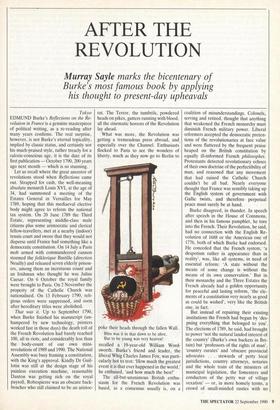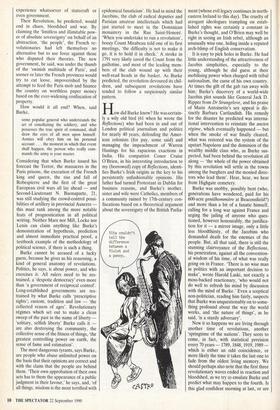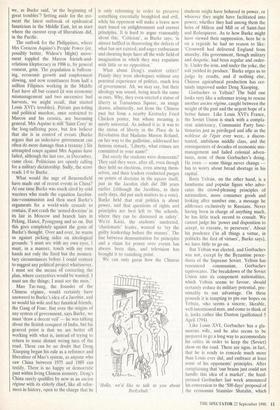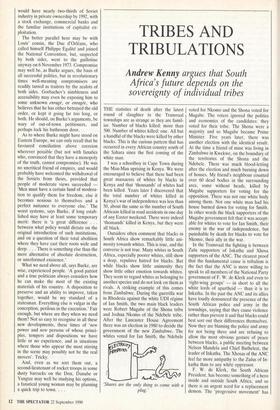AFTER THE REVOLUTION
Murray Sayle marks the bicentenary of
Burke's most famous book by applying his thought to present-day upheavals
Tokyo EDMUND Burke's Reflections on the Re- volution in France is a genuine masterpiece of political writing, as a re-reading after many years confirms. The real surprise, however, is not Burke's eternal topicality, implied by classic status, and certainly not his much-praised style, rather treacly for a calorie-conscious age, it is the date of its first publication — October 1790,200 years ago next month — which is so stunning. Let us recall where the great ancestor of revolutions stood when Reflections came out. Strapped for cash, the well-meaning absolute monarch Louis XVI, at the age of 34, had summoned a meeting of the Estates General in Versailles for May 1789, hoping that this mediaeval elective body might agree to reform the national tax system. On 20 June 1789 the Third Estate, representing middle-class male citizens plus some aristocratic and clerical fellow-travellers, met at a nearby (indoor) tennis court and swore that they would not disperse until France had something like a democratic constitution. On 14 July a Paris mob armed with commandeered cannon stormed the folklorique Bastille (direction Neuilly) and released seven elderly prison- ers, among them an incestuous count and an Irishman who thought he was Julius Caesar. On 6 October the royal family were brought to Paris. On 2 November the property of the Catholic Church was nationalised. On 13 February 1790, reli- gious orders were suppressed, and soon after hereditary titles were abolished. That was it. Up to September 1790, when Burke finished his manuscript (un- hampered by new technology, printers worked fast in those days) the death toll of the French Revolution had barely reached 100, all in riots, and considerably less than the body-count of our own mini- revolutions of 1989 and 1990. The National Assembly was busy framing a constitution, with the King's approval. Kindly Dr Guil- lotin was still at the design stage of his painless execution machine, reasonable Danton was getting rich on the royal payroll, Robespierre was an obscure back- bencher who still claimed to be an aristoc-
rat. The Terror, the tumbrils, powdered heads on pikes, gutters running with blood, all the cinematic horrors of the Revolution lay ahead.
What was more, the Revolution was getting a tremendous press abroad, and especially over the Channel. Enthusiasts flocked to Paris to see the wonders of liberty, much as they now go to Berlin to poke their heads through the fallen Wall. Bliss was it in that dawn to be alive, But to be young was very heaven!
recalled a 19-year-old William Word- sworth. Burke's friend and leader, the liberal Whig Charles James Fox, was parti- cularly hot to trot: 'How much the greatest event it is that ever happened in the world,' he enthused, 'and how much the best!'
The all-but-unanimous British enthu- siasm for the French Revolution was based, as a consensus usually is, on a coalition of misunderstandings. Colonels, serving and retired, thought that anything that weakened the French monarchy must diminish French military power. Liberal reformers accepted the democratic preten- tions of the revolutionaries at face value and were flattered by the frequent praise heaped on the British constitution by
equally ill-informed French philosophes.
Protestants detected revolutionary echoes of their own doctrine of the perfectibility of man, and reasoned that any movement that had ruined the Catholic Church couldn't be all bad. Nearly everyone thought that France was sensibly taking up the English system of government with Gallic twists, and therefore perpetual peace must surely be at hand.
Burke disagreed, in thunder. In speech after speech in the House of Commons, and then in his famous pamphlet, he tore into the French. Their Revolution, he said, had no connection with the English Re- volution of 1688 or the American one of 1776, both of which Burke had endorsed. He conceded that the French system, 'a despotism rather in appearance than in reality', was, like all systems, in need of essential reform: 'A state without the means of some change is without the means of its own conservation.' But in their monarchy and the Three Estates the French already had a golden opportunity for peaceful and lasting reform, 'the ele- ments of a constitution very nearly as good as could be wished', very like the British one, in fact.
But instead of repairing their existing institutions the French had begun by 'des- pising everything that belonged to you'. The elections of 1789, he said, had brought to power 'not the natural landed interest of the country' (Burke's own backers in Bri- tain) but 'professors of the rights of man', 'country curates' and 'obscure provincial advocates . . . stewards of petty local jurisdictions, country attorneys, notaries and the whole train of the ministers of municipal legislation, the fomenters and conductors of the petty war of village vexation' — or, in more homely terms, a crowd of small-minded rustics with no
experience whatsoever of statecraft or even government.
Their Revolution, he predicted, would end in chaos, bloodshed and war. By claiming the 'limitless and illimitable pow- er of absolute sovereignty' on behalf of an abstraction, 'the people', the French re- volutionaries had left themselves no alternative but to use force against those who disputed their theories. The new government, he said, was under the thumb of the 'swinish multitude of Paris', and sooner or later the French provinces would try to cut loose, impoverished by the attempt to feed the Paris mob and finance the country on worthless paper money based on the ever-widening confiscation of property.
How would it all end? When, said Burke,
some popular general who understands the art of conciliating the soldiery, and who possesses the true spirit of command, shall draw the eyes of all men upon himself. Armies will obey him on his personal account . . . the moment in which that event shall happen, the person who really com- mands the army is your master.
Considering that when Burke issued his forecast the Terror, the massacres in the Paris prisons, the execution of the French king and queen, the rise and fall of Robespierre and the first of the great European civil wars all lay ahead — and Second-Lieutenant N. Buonaparte, 21,
was still studying the crowd-control possi- bilities of artillery in provincial Auxerre — this must rank among the more notable feats of prognostication in all political writing. Neither Marx nor Mill, Locke nor Lenin can claim anything like Burke's demonstration of hypothesis, prediction and almost immediate practical proof, a textbook example of the methodology of political science, if there is such a thing.
Burke cannot be accused of a lucky guess, because he gives us his reasoning, a kind of general anatomy of revolutions. Politics, he says, is about power, and who exercises it. All rulers need to be res- trained, a 'despotic democracy' even more than 'a government of reciprocal control'. Long-established governments are res- trained by what Burke calls 'prescriptive rights'; custom, tradition and law — 'the collected reason of ages'. Revolutionary regimes which set out to make a clean sweep of the past in the name of liberty — 'solitary, selfish liberty' Burke calls it — are also destroying the community, the collective sense of the fitness of things, 'the greatest controlling power on earth, the sense of fame and estimation'.
The most dangerous tyrants, says Burke. are people who abuse unlimited power on
the basis that their opinions are correct and with the claim that the people are behind them. 'Their own approbation of their own acts has to them the appearance of a public judgment in their favour,' he says, and, 'of all things, wisdom is the most terrified with epidemical fanaticism'. He had in mind the Jacobins, the club of radical deputies and Parisian amateur intellectuals which had just started to meet in the Dominican monastery in the Rue Saint-Honore. 'When you undertake to run a revolution', boozy Count Mirabeau told one of its first meetings, 'the difficulty is not to make it go, it is to hold it in check.' A stroke in 1791 very likely saved the Count from the guillotine, and most of the leading mem- bers of the club wound up with their well-read heads in the basket. As Burke predicted, the revolution devoured its chil- dren, and subsequent revolutions have tended to follow a suspiciously similar pattern.
How did Burke know? He was.certain- ly a wily old bird (61 when he wrote the Reflections) who had been in and out of London political journalism and politics for nearly 40 years, defending the Amer- ican colonists (for pay, some said) and managing the impeachment of Warren Hastings for his rapacious exactions in India. His compatriot Conor Cruise O'Brien, in his interesting introduction to my (borrowed) copy of Reflections, identi- fies Burke's Irish origins as the key to his persistently unfashionable opinions. His father had turned Protestant in Dublin for business reasons, and Burke's mother, sister and wife were Catholics, members of a community ruined by 17th-century con- fiscations based on a theoretical argument about the sovereignty of the British Parlia-
ment (whose evil legacy continues in north- eastern Ireland to this day). The cruelty of arrogant ideologues trampling on estab- lished rights was certainly a constant in Burke's thought, and O'Brien may well be right in seeing an Irish rebel, although an unusually wise one, hiding inside a reputed arch-blimp of English conservatism.
It is easy to pick holes in Burke. He had little understanding of the attractiveness of Jacobin simplicities, especially to the young, although he did guess at their mobilising power when charged with tribal nationalism, the curse of his own country. At times the gift of the gab ran away with him; Burke's discovery of a world-wide Jacobin plot sounds like General Jack D. Ripper from Dr Strangelove, and his praise of Marie Antoinette's sex appeal is dis- tinctly Barbara Cartlandish. His remedy for the disaster he predicted was interna- tional intervention to reinstate the ancien regime, which eventually happened — but when the smoke of war finally cleared, what was restored was the system of the upstart Napoleon and the dominion of the wealthy middle class who, as Burke sus- pected, had been behind the revolution all along — 'the whole of the power obtained by this revolution will settle in the towns among the burghers and the monied direc- tors who lead them'. Hear, hear, we hear from Highgate cemetery.
Burke was snobby, possibly bent (who, generations have wondered, paid for his 600-acre gentilhommiere at Beaconsfield?) and more than a bit of a fanatic himself, calling for a long war against France and urging the jailing of anyone who ques- tioned, however honourably, the justifica- tion for it — a mirror image, only a little less bloodthirsty, of the Jacobins who demanded death for the enemies of the people. But, all that said, there is still the stunning clairvoyance of the Reflections, his penetration, against all the convention- al wisdom of his time, of what was really going on in France. 'There is no wise man in politics with an important decision to make', wrote Harold Laski, not exactly a moss-backed reactionary, 'who would not do well to refresh his mind by discussion with the mind of Burke.' Even a sceptical non-politician, reading him fairly, suspects that Burke was unquestionably on to some- thing profound about the way the world works, and 'the nature of things', as he said, 'is a sturdy adversary'.
Now it so happens we are living through another time of revolutions, another 'springtime of the nations'. They seem to come, in fact, with statistical precision every 70 years — 1789, 1848, 1919, 1989 — which is either an odd coincidence, or more likely the time it takes the last one to fade from the oldest living memory. We should perhaps also note that the first three revolutionary waves ended in reaction and bloodshed, as we try to emulate Burke and predict what may happen to the fourth. Is this glad confident morning at last, or are we, as Burke said, 'at the beginning of great troubles'? Setting aside for the mo- ment the latest outbreak of epidemical fanaticism in the Middle East, let us start where the current crop of liberations did, in the Pacific.
The outlook for the Philippines, where Mrs Corazon Aquino's People Power (or, possibly better, Widow's Might) move- ment toppled the Marcos friends-and- relations kleptocracy in 1986 is, by general consent, grim. The population is balloon- ing, economic growth and employment slowing, and now remittances from half a million Filipinos working in the Middle East have all but ceased (it was economic mismanagement and two successive bad harvests, we might recall, that started Louis XVI's troubles). Private gun-toting and political murders, once restricted to Marcos and his cronies, are becoming general. Mrs Aquino is still 'Saint Cory' to the long-suffering poor, but few believe that she is in control of events (Burke argues that an indecisive government can often do more damage than a tyranny.) Six attempted coups against Mrs Aquino have failed, although the last one, in December, came close. Politicians are openly calling for a military dictatorship. Sadly, the score reads 1-0 to Burke.
What would the sage of Beaconsfield have made out of recent events in China? At one time Burke was much cited by cold warriors who made the equation Jacobin- ism=communism and then used Burke's arguments for a world-wide crusade to contain, if not crush the 'armed doctrine' in its lair in Moscow and branch lairs in Peking, Hanoi, Pyongyang and so on. But this goes completely against the grain of Burke's thought. Over and over, he warns us against picking sides on ideological grounds: 'I must sec with my own eyes, I must, in a manner, touch with my own hands not only the fixed but the momen- tary circumstances before I could venture to suggest any political project whatsoever. I must see the means of correcting the plan, where correctives would be wanted. I must see the things; I must see the men.'
Mao Tse-tung, the founder of the Chinese regime, would certainly have answered to Burke's idea of a Jacobin, and so would his wife and her fanatical friends, the Gang of Four. But over the origins of any system of government, says Burke, we must 'draw a decent veil' — he was talking about the British conquest of India, but his general point is that we are better off working with what is, instead of trying to return to some distant wrong turn of the road. There can be no doubt that Deng Xiaoping began his rule as a reformer and liberaliser of Mao's system, as anyone who saw China between 1975 and 1989 can is only reforming in order to preserve something essentially benighted and evil, while his opponent will make a brave new start based on enlightenment and correct principles. It is hard to argue reasonably about this. 'Criticism', as Burke says, 'is almost baffled in discovering the defects of what has not existed; and eager enthusiasm and cheating hope have all the wide field of imagination in which they may expatiate with little or no opposition.'
What about Deng's student critics? Plainly they were ideologues without any practical experience of politics, much less of government. Ah, we may say, but their ideology was sound, being much the same as ours. Why, they even erected a statue of liberty in Tiananmen Square, an image drawn, admittedly, not from the Chinese past but from a nearby Kentucky Fried Chicken poster, but whose meaning is surely universal. As indeed it is: it was to the statue of liberty in the Place de la Revolution that Madame Manon Roland, on her way to the guillotine, addressed her famous remark, 'Liberty, what crimes are committed in your name!'
But surely the students were democrats? They said they were, after all, even though they held no elections, even among them- selves, and their leaders conducted purges on points of doctrine in the square itself, just as the Jacobin club did 200 years earlier (although the Jacobins, in their early days, did put such matters to a vote). Burke held that real politics is about power, and that questions of rights and principles are best left to 'the schools, where they can be discussed in safety'. Wu'er Kaixi, the students' unelected, 'charismatic' leader, wanted to 'try the guilty leadership before the masses'. The line between demonstration for principles and a claim for power over events has always been thin, and television has brought it to vanishing point.
We can only guess how the Chinese 'Hello, we'd like to talk to you about Beelzebub,' students might have behaved in power, or whoever they might have facilitated into power; whether they had among them the heirs of Milton and Mill or of Saint-Just and Robespierre. As to how Burke might have viewed their suppression, here he is on a regicide he had no reason to like: 'Cromwell had delivered England from anarchy. His government, though military and despotic, had been regular and order- ly. Under the iron, and under the yoke, the soil yielded its produce.' Burke urges us to judge by results, and if nothing else, Chinese agricultural production has cer- tainly improved under Deng Xiaoping.
Gorbachev vs Yeltsin? The bald one looks very like a reformer trying to rescue another ancien regime, caught between the weight of the past and the urgent hope of a
better future. Like Louis XVI's France, the Soviet Union is stuck with a compla- cent aristocracy, Communist Party func- tionaries just as privileged and idle as the noblesse de !'epee ever were, a discon- tented, ambitious middle class, and the consequences of decades of economic mis- management and failed colonial adven- tures, none of them Gorbachev's doing.
He even — some things never change — has to worry about bread shortage in his capital.
Boris Yeltsin, on the other hand, is a handsome and popular figure who advo- cates the crowd-pleasing principles of nationalism, more consumer goods and looking after number one, a message he addresses exclusively to Russians. Never having been in charge of anything much, he has little track record to consult. We cannot judge his 'power and disposition to accept, to execute, to persevere'. About his prudence (In all things a virtue, in politicks the first of virtues', Burke says), we have little to go on,
But Yeltsin was elected, and Gorbachev was not, except by the Byzantine proce- dures of the Supreme Soviet. Yeltsin has renounced communism, Gorbachev equivocates. The breakdown of the Soviet Union into its component nationalities, which Yeltsin seems to favour, should certainly reduce its military potential, pre- sumably to our advantage. On these grounds it is tempting to pin our hopes on Yeltsin, who seems a sincere, likeable, well-intentioned man, and come to think of it, looks rather like Danton (guillotined 5 April 1794).
Like Louis XVI, Gorbachev has a gla- morous wife, and he also seems to be prepared to go a long way to accommodate his critics in order to keep the (Soviet) show on the road. There are signs, in fact, that he is ready to concede much more than Louis ever did, and embrace at least some of his opponents' principles. After complaining that 'our brains just could not handle this idea of a market', the hard- pressed Gorbachev last week announced his conversion to the '500 days' proposal of the economist Stanislav Shatalin, which would have nearly two-thirds of Soviet industry in private ownership by 1992, with a stock exchange, commercial banks and the familiar institutions of capitalist ex- ploitation.
The better parallel here may be with Louis' cousin, the Duc d'Orleans, who called himself Philippe Egalite and joined the National Convention, but, suspected by both sides, went to the guillotine anyway on 6 November 1973. Compromise may well be, as Burke argues, the basis of all successful politics, but in revolutionary times well-meaning compromisers are readily tarred as traitors by the zealots of both sides. Gorbachev's nimbleness and
accessibility may even be exposing him to some unknown enrage, or enragee, who
believes that he has either betrayed the old order, or kept it going far too long, or both. He should, on Burke's arguments, be wary of out-of-town petitioners, and perhaps lock his bathroom door.
As to where Burke might have stood on Eastern Europe, we can only recall that he favoured conciliation above coercion wherever possible (but not with fanatics who, convinced that they have a monopoly of the truth, cannot compromise). He was no uncritical friend of empires, and would probably have welcomed the withdrawal of the Soviets from theirs, provided that people of moderate views succeeded — 'Men must have a certain fund of modera- tion to qualify them for freedom, else it becomes noxious to themselves and a perfect nuisance to everyone else.' The worst systems, says Burke, if long estab- lished may have at least some temporary merit: there is 'a great difference . . .
between what policy would dictate on the original introduction of such institutions, and on a question of their total abolition where they have cast their roots wide and deep.. . There is something else than the mere alternative of absolute destruction, or unreformed existence.'
What we need above all, says Burke, are wise, experienced people. 'A good patriot and a true politician always considers how he can make the most of the existing materials of his country. A disposition to preserve and an ability to improve, taken together, would be my standard of a statesman. Everything else is vulgar in the conception, perilous in the execution.' Fair enough, but where are they when we need them? Not so easy to recognise in all these
new developments, these times of 'new power and new persons of whose princi- ples, tempers and dispositions we have little or no experience, and in situations where those who appear the most stirring in the scene may possibly not be the real movers'. Tricky.
And, even as we sort them out, a second-lieutenant of rocket troops in some dusty barracks on the Don, Danube or Yangtze may well be studying his options, a fanatical young woman may be planning a quick trip to town. . . .





































































 Previous page
Previous page